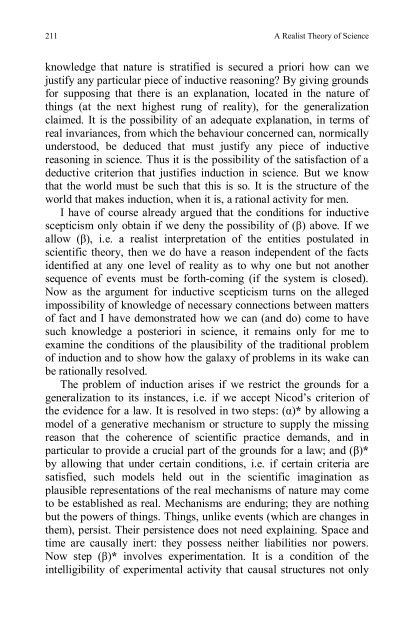A Realist Theory of Science Roy Bhaskar
A Realist Theory of Science Roy Bhaskar
A Realist Theory of Science Roy Bhaskar
You also want an ePaper? Increase the reach of your titles
YUMPU automatically turns print PDFs into web optimized ePapers that Google loves.
211 A <strong>Realist</strong> <strong>Theory</strong> <strong>of</strong> <strong>Science</strong><br />
knowledge that nature is stratified is secured a priori how can we<br />
justify any particular piece <strong>of</strong> inductive reasoning? By giving grounds<br />
for supposing that there is an explanation, located in the nature <strong>of</strong><br />
things (at the next highest rung <strong>of</strong> reality), for the generalization<br />
claimed. It is the possibility <strong>of</strong> an adequate explanation, in terms <strong>of</strong><br />
real invariances, from which the behaviour concerned can, normically<br />
understood, be deduced that must justify any piece <strong>of</strong> inductive<br />
reasoning in science. Thus it is the possibility <strong>of</strong> the satisfaction <strong>of</strong> a<br />
deductive criterion that justifies induction in science. But we know<br />
that the world must be such that this is so. It is the structure <strong>of</strong> the<br />
world that makes induction, when it is, a rational activity for men.<br />
I have <strong>of</strong> course already argued that the conditions for inductive<br />
scepticism only obtain if we deny the possibility <strong>of</strong> (β) above. If we<br />
allow (β), i.e. a realist interpretation <strong>of</strong> the entities postulated in<br />
scientific theory, then we do have a reason independent <strong>of</strong> the facts<br />
identified at any one level <strong>of</strong> reality as to why one but not another<br />
sequence <strong>of</strong> events must be forth-coming (if the system is closed).<br />
Now as the argument for inductive scepticism turns on the alleged<br />
impossibility <strong>of</strong> knowledge <strong>of</strong> necessary connections between matters<br />
<strong>of</strong> fact and I have demonstrated how we can (and do) come to have<br />
such knowledge a posteriori in science, it remains only for me to<br />
examine the conditions <strong>of</strong> the plausibility <strong>of</strong> the traditional problem<br />
<strong>of</strong> induction and to show how the galaxy <strong>of</strong> problems in its wake can<br />
be rationally resolved.<br />
The problem <strong>of</strong> induction arises if we restrict the grounds for a<br />
generalization to its instances, i.e. if we accept Nicod’s criterion <strong>of</strong><br />
the evidence for a law. It is resolved in two steps: (α)* by allowing a<br />
model <strong>of</strong> a generative mechanism or structure to supply the missing<br />
reason that the coherence <strong>of</strong> scientific practice demands, and in<br />
particular to provide a crucial part <strong>of</strong> the grounds for a law; and (β)*<br />
by allowing that under certain conditions, i.e. if certain criteria are<br />
satisfied, such models held out in the scientific imagination as<br />
plausible representations <strong>of</strong> the real mechanisms <strong>of</strong> nature may come<br />
to be established as real. Mechanisms are enduring; they are nothing<br />
but the powers <strong>of</strong> things. Things, unlike events (which are changes in<br />
them), persist. Their persistence does not need explaining. Space and<br />
time are causally inert: they possess neither liabilities nor powers.<br />
Now step (β)* involves experimentation. It is a condition <strong>of</strong> the<br />
intelligibility <strong>of</strong> experimental activity that causal structures not only


